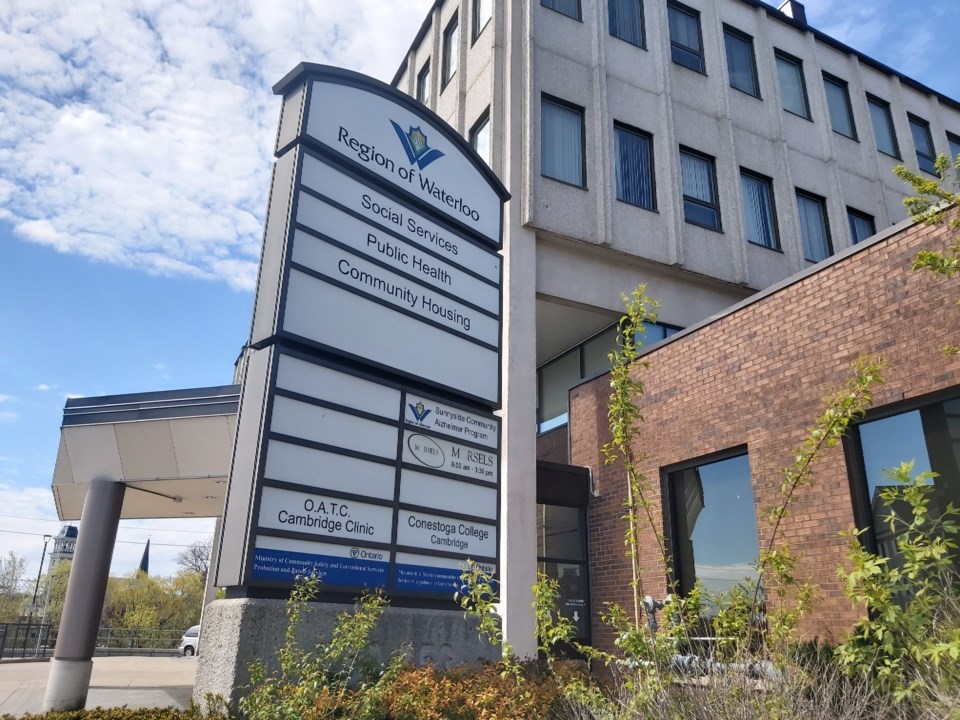A partnership between the AIDS Committee of Cambridge, Kitchener-Waterloo and Area (ACCKWA) and the Family Counselling Centre of Cambridge and North Dumfries (FCCCND) is now offering free walk-in counselling once a week, for those experiencing homelessness.
Every Thursday, from 1-4 p.m., a counsellor from FCCCND will be at the Multi-Agency Community Space (MACS), a drop-in hub that supports individuals experiencing homelessness, at 150 Main St. in Cambridge.
“We want to be able to provide some outreach and make our counselling service as accessible as possible,” said Cameron Dearlove, executive director at FCCCND.
“Being in a place like MACS, it’s a very busy space. There are about 50-60 people accessing it on a given day. Folks are already comfortable there, so we thought well, lets bring the service to them.”
The need for services continues to grow as does an encampment at 150 Main St. The camp is made up of over a dozen tents currently, with more than 20 people living on site.
“ACCKWA has been very accommodating, and we have a confidential space where we can provide counselling. We have two counsellors who have a particular interest for working with these groups and they alternate Thursdays,” Dearlove said.
Dearlove said the service is there and it’s free.
“People can access walk-in counselling as well as gain a relationship with the counsellors,” he said.
For over 60 years, FCCCND has continued to provide counselling and addictions services to help support the emotional well-being of people in Cambridge and North Dumfries.
“We have traditionally done walk-in counselling at the Family Counselling Centre but as with many agencies, during the pandemic, that stopped,” Dearlove said.
“But we were able to start up again at the beginning of September. We offer walk-in counselling in person, by phone, and by video. It’s very accessible.”
Dearlove said that FCCCND strives to be as accessible as possible.
“We always try to get right into the community, to be in the places where people are already, and where they feel comfortable,” Dearlove said.
“We’ve had offices at the Cambridge Food Bank and at a number of Cambridge community centres in the past. MACS at 150 Main St. started at the beginning of the pandemic. It’s about creating a drop-in space for people experiencing homelessness where they can get all kinds of resources.”
ACCKWA’s MACS satellite in Cambridge is a coordinated collaborative homelessness hub that provides a number of services including mental health, supports for affordable and supportive housing, addictions treatment, primary healthcare, harm reduction supports, encampment outreach, overdose response, and support for individuals with acquired traumatic brain injury.
When access to services became limited during the first wave of COVID-19, agencies that support the city's homeless individuals sought ways to close the gaps created when shelter spaces closed down, and outreach services were disrupted.
The solution brought supporting agencies together under one roof to create MACS in 2020.
With free counselling now being offered on Thursdays, Ruth Cameron, executive director at ACCKWA, said that there are hopes for both agencies to be able to expand these services and to be able to offer others, more focused on addictions.
“It is a great partnership with FCCCND. General mental health in addition to supports around substance use and addictions are needed. People need different things in this service context where we are helping people who are very marginalized,” Cameron said.
“There’s the partnership between us but then there are also all the other organizations that are doing great work when it comes to addictions treatment.”
But Cameron said, for each agency at MACS, the need for continued supports is ongoing.
“With ACCKWA doing harm reduction and overdose response, FCCCND doing family and general counselling, and the others who provide addiction streamed and focused services, all of us, we all just need more resources to do our piece, there needs to be more resourcing for each of these pieces of the puzzle,” Cameron said.
Dearlove said FCCCND has been fortunate with a number of grants that have allowed the agency to grow its team.
“It's great to have the capacity to offer this counselling right now," Dearlove said.
“If we can continue to find additional funding to help support this, we hope this is something we can continue to grow.”
Dearlove said for those who are homeless, booking counselling sessions can be difficult, and often, next to impossible.
“We are just trying to be as responsive as we can to the mental health needs in the community which are very extensive right now,” Dearlove said.
“We know that can be more challenging because their day to day is unpredictable. To make it as easy as possible, we just want to offer this counselling right there, at MACS.”
